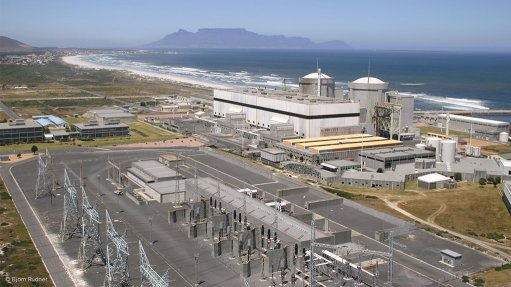
The Koeberg nuclear power station
The International Energy Agency (IEA) has come out in support of nuclear plant lifetime extension programmes, as Eskom pushes ahead with its plans to extend the life of the Koeberg nuclear power station, in the Western Cape.
A new IEA report, titled ‘Nuclear Power and Secure Energy Transitions’, argues that life extensions are a “cost-effective source of low-emission electricity, estimated at less than $50/MWh for a 10- to 20-year extension”.
“Where the operations of reactors can be safely extended, obtaining new regulatory approvals and mobilising investment in them will be critical to maximising the overall contribution of nuclear power to the clean energy transition.”
The report notes that about 260 GW, or 63%, of today’s nuclear plants are over 30 years old and nearing the end of their initial operating licences.
“Despite moves in the past three years to extend the lifetimes of plants representing about 10% of the worldwide fleet, the nuclear fleet operating in advanced economies could shrink by one-third by 2030.”
The IEA’s Net Zero Emissions by 2050 Scenario assumes that the lives of over half of these plants will be extended, cutting the need for other low-emission options by almost 200 GW.
The extension of Koeberg, meanwhile, is catered for in South Africa’s current Integrated Resource Plan, which is under review.
The extension remains controversial, however, owing to environmental and safety concerns – concerns that have been amplified as a result of recent delays to both the steam generator replacement (SGR) project at Koeberg Unit 2, as well as a fresh delay in returning the unit to service amid intensifying load-shedding.
Despite a decision to defer the replacement of the steam generators at Unit 2 to August 2023, Eskom still missed its initial deadline for returning the unit by mid-June and has set July 15 as the new date for the restart, with full ramp-up anticipated by July 25.
During the extended outage, Eskom reports that 50 000 activities were undertaken, including modifications to the reactor pressure vessel head, which is also key to the life extension.
However, it has also meant that any load-shedding during the period has been increased by a full stage, or 1 000 MW, to cater for the absence of Unit 2.
It has also led to a far more extensive use of the diesel-fuelled open-cycle gas turbines, with Eskom having burnt 217-million litres even ahead of the recent bout of Stage 4 to Stage 6 load-shedding at the end of June.
Nevertheless, Eskom has repeatedly argued in favour of both the SGR programme and the overall life extension project ahead of the expiry of Koeberg’s operating licence in July 2024.
Eskom officially notified the National Nuclear Regulator (NNR) in July 2020 of its intention to extend the lifespan of the Koeberg nuclear power station for another 20 years and has to apply to the NNR for Long-Term Operations (LTO) licensing.
In late March, the International Atomic Energy Agency conducted a peer review mission of the safety aspects of the Koeberg LTO, including preparedness, organisation, and programmes for safe operation.
Meanwhile, the IEA argues in its report that, while plant lifetime extensions require substantial investment, “they generally yield a cost of electricity that is competitive with wind and solar in most regions”.
The cost of Koeberg’s life extension has been estimated at R20-billion.